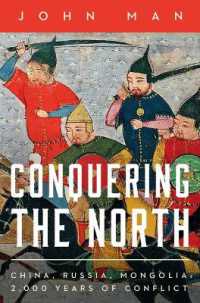- ホーム
- > 洋書
- > 英文書
- > Psychology
Full Description
So you want to be an Industrial-Organizational (I-O) Psychologist? You may have heard that it is one of the fields of the future, fast-growing, and a highly sought-after profession. But what is Industrial-Organizational Psychology? What does an Industrial-Organizational Psychologist do? Answering these questions and many more, Becoming an Industrial-Organizational Psychologist is the perfect introduction, providing an expert overview of careers in Industrial-Organizational Psychology, the study of human behavior in the workplace.
Part 1 of the book discusses what I-O Psychology is and what I-O Psychologists do, including the history of the field, research areas, and job types and titles. Part 2 discusses the undergraduate years, including how to make oneself competitive for graduate school, and going through the process of identifying graduate programs, applying, and deciding on the right program. Part 3 focuses on the graduate years, including advice on success in a graduate program and in internships, as well as additional issues like licensure and transitioning from other careers. Finally, Part 4 discusses how to find a job and begin a career in the various sectors of I-O Psychology: academic, consulting, industry, and government.
Contents
Preface
Part 1. Beginning Thoughts
Chapter 1. Introduction
Chapter 2. The I-O Psychologist.
Part 2. The Undergraduate Student Years
Chapter 3. Pursuing I-O as an Undergraduate
Chapter 4. Applying to Graduate School
Chapter 5. Types of I-O Graduate Programs
Chapter 6. Decisions, Decisions, Decisions: Selecting the Right Program and Offer
Part 3. The Graduate Student Years
Chapter 7. The Graduate School Years
Chapter 8. Applied Experience and Internships
Chapter 9. Licensure and Certification
Chapter 10. Cha-Cha-Changes: Transitioning into I-O
Part 4. Careers
Chapter 11. Academic Jobs and Careers
Chapter 12. Consulting Jobs and Careers
Chapter 13. Industry Jobs and Careers
Chapter 14. Government Jobs and Careers
Part 5. Concluding Thoughts
Chapter 15. Concluding Thoughts








